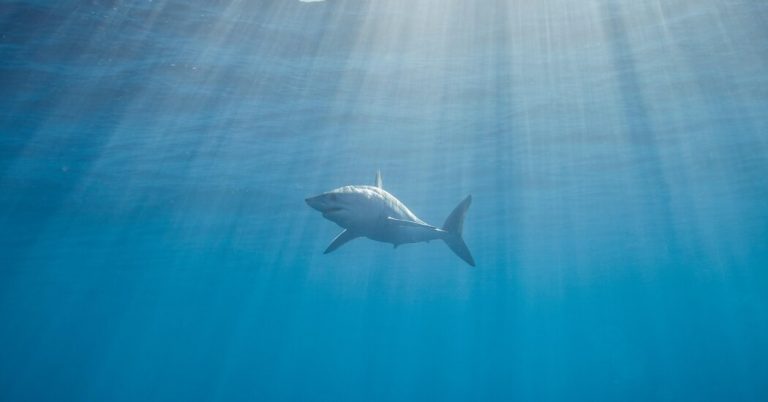
A number of firms within the race for a coronavirus vaccine have stumbled upon a brand new and surprising hurdle: activists protesting using a substance that comes from sharks of their merchandise.
The oily compound, known as squalene, is churned out by shark livers and has immunity-boosting powers, which has led a number of firms to make use of it as an ingredient in vaccines. A gaggle known as Shark Allies has mounted a marketing campaign calling on the Meals and Drug Administration and different regulatory our bodies to halt the sourcing of the compound from sharks, warning that mass distribution of a coronavirus vaccine might require harvesting tissue from greater than 500,000 sharks.
The decision to motion made headlines across the globe. However the story on shark squalene isn’t as clear-cut as it’d at first appear.
Why are some individuals so upset about sharks and vaccines?
Firms generally use squalene as a moisturizing additive in cosmetics and sunscreens. However the substance has additionally been sometimes utilized in vaccines as an adjuvant — a chemical that kick-starts the immune system into motion, driving stronger, longer-lasting safety towards illness.
Though adjuvants aren’t obligatory for all vaccines, they’ll make or break sure recipes. By boosting merchandise’ immunity-priming powers, they’ll additionally improve the immunization’s effectivity, giving the vaccine’s substances extra bang for his or her buck and releasing up provides for extra doses.
Shark livers are thought-about among the many greatest sources of the compound. Between 63 million and 273 million sharks die by the hands of people every year, and liver oil is harvested from at the least a pair million of them, in keeping with Catherine Macdonald, a shark biologist in Florida.
Two of the businesses underneath the scrutiny of Shark Allies are GlaxoSmithKline and Seqirus, which every manufacture adjuvants that comprise about 10 milligrams of squalene per dose. These substances are present in quite a lot of coronavirus vaccines at present being examined in people, together with merchandise from Sanofi, Medicago and Clover Biopharmaceuticals, which have all partnered with GSK.
Based on one estimate, between 2,500 and three,000 sharks are wanted per metric ton of squalene. Shark Allies extrapolated from these statistics to reach at their extensively quoted numbers tabulating the potential ecological toll on sharks.
Are Shark Allies’ numbers real looking?
Such estimates are tough to make.
Dr. Macdonald identified that sharks — of which there are greater than 500 species worldwide — fluctuate in dimension, weight and liver squalene content material. The variety of sharks required to yield sufficient squalene-adjuvanted vaccine doses to deal with everybody on Earth is thus more likely to be a “big vary,” she mentioned. Her personal calculations for this statistic stretch between tens of hundreds and greater than one million, relying on what number of doses are wanted per particular person.
It’s additionally the case that of the handfuls of vaccine candidates in medical trials in individuals, most don’t embrace squalene. To solely depend on vaccines that use shark-based squalene, “a ton of different promising candidates must fail — they must be the final vaccines standing,” mentioned Saad Omer, a vaccine skilled at Yale College. A extra believable situation would most likely contain the distribution of a number of merchandise made by a number of firms.
Are there alternate options to shark oil?
However squeezing squalene out of crops is a ache, whereas “shark oil is affordable and simple to come back by,” mentioned Stefanie Brendl, the manager director of Shark Allies.
“We really feel that’s not an excuse,” she mentioned.
She pointed to Amyris, a California-based firm, which has been pursuing an artificial various.
Evan Berland, director of U.S. company communications for GSK, mentioned the corporate “is dedicated to environmental stewardship and is actively exploring the potential for various sources of its uncooked supplies when doable.”
No squalene alternate options, nonetheless, could be out there “inside the time-frame of the Covid-19 pandemic,” he mentioned.
Joanne Cleary, a Seqirus spokeswoman, mentioned her firm was in an analogous scenario. “Extra will should be finished to analysis plant-based or artificial alternate options earlier than they can be utilized in vaccines,” she mentioned.
Swapping adjuvants, and even adjuvant sources, isn’t trivial, Dr. Omer mentioned. Every product must be refined and examined to make sure it’s secure and efficient, and work its approach — usually ploddingly — by way of the mandatory regulatory steps.
Are vaccine makers responsible for harvesting shark squalene?
Neither GSK nor Seqirus named their suppliers. However GSK mentioned the sharks their squalene got here from had been “sometimes caught for different functions.”
Dr. Macdonald mentioned it’s unattainable to reply questions concerning the actual variety of sharks that will be killed explicitly for his or her squalene. Fishers seize sharks for his or her meat or fins, or just as bycatch; in lots of circumstances, the oil pulled from their our bodies may in any other case have been discarded.
So do you have to actually fear that coronavirus vaccines will end in a mass culling of sharks?
No.
Even the Shark Allies staff doesn’t suppose the vaccine business is “going out and searching down sharks — we’re not saying that in any respect,” Ms. Brendl mentioned. Nor do they want for firms to terminate or delay coronavirus vaccine manufacturing.
“However there are alternate options to shark adjuvants,” she mentioned. “Begin testing them.”
Dr. Macdonald and others famous that vaccine producers certainly not bear the brunt of the duty for hoarding shark liver oil. Most fish-sourced squalene continues to be routed to cosmetics — “a lot much less essential issues” than vaccines, mentioned Jasmin Graham, a shark biologist at Mote Marine Laboratory in Florida.
Crafting extra sustainable fishing practices, she mentioned, might assist deal with a number of points without delay.
“I don’t suppose we must always demonize the individuals attempting to save lots of our lives,” Ms. Graham mentioned. “There are a lot bigger, extra essential hills to die on.”